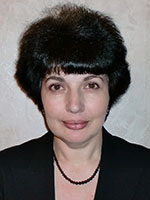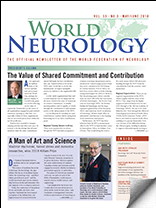I am honored to be nominated for the position of the WFN Trustee. The achievements of the WFN for more than 50 years of its history are tremendous. I hope to be able to contribute to the accomplishment of the WFN mission – to foster quality neurology and brain health worldwide – on the background of my clinical, academic, and administrative expertise and the experience gained while being involved in clinical practice, research, high-level initiatives, and events in epilepsy, stroke, cognitive impairment, and other brain diseases in collaboration with WHO, as well as professional organizations in many areas of neurology.

Alla Guekht
Neurology has been a vital and integral part of all my life. I inherited the passion regarding neurology from my late father. I was fortunate to have outstanding mentors, and now I am happy to teach young doctors, guiding them in clinical practice and research, with more than 25 completed PhD and doctoral dissertations.
With a background in general neurology, I have been taking care of patients for 30 years. My PhD was in EEG monitoring in carotid surgery and doctoral dissertation — in brain plasticity and restoration after stroke. Currently, I am doctor of medical sciences, director of Moscow Research and Clinical Center for Neuropsychiatry, professor of neurology at the Russian National Research Medical University, supervising the regional stroke center and neurological clinic in the huge multidisciplinary hospital in Moscow.
My main areas of research are epilepsy, post-stroke cognitive impairment, restoration after stroke, and neuroepidemiology. I have the privilege of being a member of the editorial boards of the Journal of the Neurological Sciences, the WFN journal, European Journal of Stroke, Acta Neurologica Scandinavica, author of more than 170 PubMed-listed publications, including over 60 papers in peer-reviewed international journals and book chapters, several books/ manuals, and national guidelines. I received several prestigious international and national awards, including the AAN Bruce S. Schoenberg Award.
Of more immediate relevance to the nomination for the WFN trustee is my expertise gained while working for more than 15 years on the WFN Education Committee. I am proud to belong to the team fostering the education worldwide and successfully developing important educational initiatives, including Continuum. Being involved in the international collaboration through education, several Eastern European countries eventually joined the WFN.
I am the secretary and the WFN delegate of the National Society of Neurologists. For several years, I worked as the chief neurologist of Moscow, where meaningful improvement of care for patients with stroke, epilepsy, and multiple sclerosis has been achieved.
WFN maintains strong partnerships with the World Health Organization — a rare privilege among professional organizations. I acquired experience that may be useful for the WFN and the World Brain Alliance, as for many years I have contributed to the significant WHO activities in non-communicable diseases, including the 68th WHA Resolution on epilepsy, mhGAP, and several WHO initiatives in dementia and Parkinson’s disease. I feel privileged to be involved in the work on bringing back stroke to neurological diseases in ICD11, which is a major achievement for future neurology.
Following our president’s approach to develop cooperative strategies, I can be instrumental in promoting productive and effective collaboration, also in the framework of the World Brain Alliance, with the key professional organizations in brain diseases, namely, International League Against Epilepsy (ILAE) and World Stroke Organization (WSO), where I am honored to be significantly involved, being the ILAE vice president, member of the WSO Educational Committee and Steering Committee of the Action Plan for Stroke in Europe. For many years, I have been an invited lecturer/chair to the WFN, EFNS/EAN, ILAE, and WSO Congresses; a member of the Organizing/Program Committees of the international and national meetings in brain diseases.
I came from a country situated geographically in Europe and Asia with many regions different in their ethnic, cultural, economic, and historical background. I have been involved in developing neurological education and care in Eastern Europe, managing a range of available resources, from quite appropriate to limited; this experience in recognition and addressing specific needs could be of value in implementing the WFN mission.
There are many examples that women can effectively contribute to medicine, research, and administration. WFN has no women among the elected trustees; it might be beneficial for the WFN to aim for a gender balance in the leadership.
I would be honored, if elected, to serve the WFN as a trustee, to enrich traditions and implement the WFN strategy, fostering the new developments and collaboration with member societies and neurologists all around the world, prioritizing communication, education, and partnership. •
